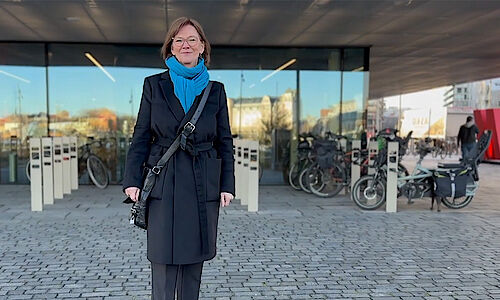News & Academies' activities
How the energy transition can succeed
Which renewable energy sources will play a role in the future? How can the population be won over to the transformation of energy systems? Scientists will discuss this on November 6, 2023 at the Joint Academy Day of the Austrian Academy of Sciences (ÖAW) in Vienna on November 6, 2023.
At the beginning of this heating season, most countries are better prepared for winter than last year, gas storage facilities are filled, and the geography of our fuel suppliers has been changed. Yet, two big challenges remain unresolved: Over 40 million Europeans are unable to keep their homes adequately warm and climate change continues to progress.To address these challenges, the European Union aims to increase the share of renewable energy sources to at least 42.5% by 2030. Eight European countries already have policies in place for banning new natural gas boilers, and this number is growing.
From the perspective of the European Academies Advisory Council (EASAC), these political initiatives point in the right direction. EASAC has been invited by the Austrian Academy of Sciences (ÖAW) to Vienna on November 6, 2023 to discuss solutions for a sustainable energy supply of the future at a Joint Academy Day. EASAC recently addressed this issue in a comprehensive report entitled "Future of Gas" (https://easac.eu/publications/details/future-of-gas).
Ramp up renewable energies
“Our Future of Gas report underlines that to mitigate climate change, it is critical to phase out all fossil fuels including gas, and massively ramp up renewable electricity generation. Electrification is gaining momentum in mobility, green hydrogen will contribute to decarbonizing industry, heat pumps, geothermal and district heating based on renewables are readily available alternatives to fossil fuels for heating”, explains William Gillett, EASAC’s Energy Programme Director. “Neither CCS nor new nuclear plants based on current or small modular reactor technology can be built quickly enough.”
However, geopolitical volatility is beginning to reduce the confidence of households and other investors, and this is a bleak prospect for climate protection. “Transparency, participation, especially in the regional arena, and reliable planning for the necessary transition from fossil fuels to renewable alternatives are more important than ever”, says EASAC President Wim van Saarloos.
Strengthen public acceptance
ÖAW President Heinz Faßmann says: "Many uncoordinated individual measures that overburden the population - some of which are being softened and withdrawn again - are unsettling and causing declining support for tackling climate change. We risk losing support for this essential step, while political parties with extreme positions that deny climate change gain popularity. This helps no one. Therefore, a clear prioritisation of measures - e-mobility, decarbonisation of electricity and heat supply to industry and to private households - is important."
Ulrike Diebold, Vice President of the Austrian Academy of Sciences, is concerned about two issues. "Financially vulnerable consumers must be adequately supported for the energy transition to succeed. People can’t engage with the energy transition if they can't afford it. Social cushioning is crucial to achieve public acceptance and support for the upcoming changes." She also emphasizes the need for storage in energy systems based on variable renewable energy from wind and solar. "In this domain, we still need to understand the underlying physical processes and the potential for using alternative materials much better." As a professor at the Vienna University of Technology, Diebold is involved in the Cluster of Excellence on "Energy Conversion," which also deals with new, energy-related materials.
back to overview
































